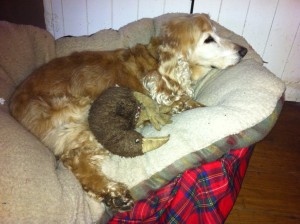Caring For Older Dogs.
As our beloved dogs get older, they can go through many different changes physically, as well as mentally. This Holidays4Dogs article will find out more about at some of the changes that can occur as our dogs enter their golden years. Read on for some insights into caring for older dogs.
Our canine companions can show similar signs to people as they age. Their bones become creakier, they have less patience and less energy. However, older dogs have settled into a routine, they can still act like puppies on occasion and they still provide company and companionship. Older rescue dogs often make lovely, calm, pets – so if you’re thinking of offering a senior dog a lovely retirement home where they can be offered empathy, comfort and love – please get in touch with your local rescue centres.
Muscular and Skeletal Changes in older dogs.
Just like people, the aging dog goes through many physical changes and some of them can be quite acute. Senior dogs lose muscle mass and as a result, mobility is likely to be affected. Because dogs are social creatures, this lack of mobility may affect their behaviour. For instance, the elderly dog might become anxious if they can no longer follow their owner around or, jump onto the furniture.
A solution may be to provide the dog with a comfy bed, placed in the centre of household activity. A dog who may be in discomfort because of a loss of body mass, will find lying on a hard floor uncomfortable. Likewise, older dogs may no longer want, or need, long walks. Some may enjoy a potter in the park, a ‘sniff walk’ or, a meander around the garden.
If the dog is in physical discomfort they may be grumpier than usual. Always get your dog checked over by a vet if you think they may be in pain. Some dogs can react by growling, or snapping, if they are in discomfort – especially if they are being pestered by a younger boisterous dog, or even a child – older dogs can be become less tolerant of their space being invaded – so it’s important to be mindful of this.
Sight and Hearing Changes.
Cataracts are a common visible change that owners will recognise in their dogs. Sometimes, this can contribute to possible aggression if the dog becomes startled unexpectedly. If your dog can still hear ok, speak to them before you touch them – particularly if they have their back to you.
Deafness can also impact on a dog’s change in behaviour. A once obedient dog, may appear ‘stubborn’. However, with patience, it is possible to substitute hand signals for verbal commands. Many older dogs get the hang of this, as long as their sight isn’t affected.
Some older dogs with hearing loss may begin to bark more frequently than they used to. It is important to understand that hearing loss can change a dog’s perspective of the world immensely. This is even more marked if they have also lost some of their sight as well.
Incontinence in the ageing dog.
This can be one of the most frustrating things for owners to deal with when caring for older dogs. Unfortunately, kidney function does deteriorate with age and urinary incontinence is a common issue in the aging dog.
Allowing your dog more frequent access to the outdoors often helps, but you should never limit your dog’s access to water – not even at night. As with a deaf dog, it might be a solution to keep an incontinent dog near to you during the night so you can be more aware if they ask to go out. Otherwise, you could resort to using newspaper, or puppy pads, for night time use. Not all elderly dogs become incontinent though.
 Cognitive Dysfunction.
Cognitive Dysfunction.
Many older dogs can become confused or, disorientated as they age and this can be unsettling for them. For dogs who seem confused by their environment, it is essential to provide a safe, enclosed space, for when you cannot be around.
Some elderly pets will be a lot less attentive than they were in their younger years but they will still enjoy company of other dogs and people. It’s always good to try and remain patient with a dog that shows signs of confusion.
Changes in Routine.
Senior dogs can often begin to dislike a change in routine. They may become stressed or anxious with new people or, new environments. Even in a previously confident dog, they may become less equipped to deal with the stresses of a busy holiday, or a long car journey, for example. Just like people, many elderly dogs will prefer a quiet, sedate life – perfect if you’re looking to adopt a laid-back companion who is past the need for lengthy hikes.
It is worth noting that Holidays4Dogs have some wonderful highly experienced carers who are happy to look after elderly dogs.
Final thoughts on the ageing dog.
Many changes take place in our pet dogs as they reach old age, so there may need to be some adjustments when caring for older dogs. However, with plenty of love and patience, as well as prompt veterinary care, our four-legged friends can live long and comfortable lives, while still providing us with their wonderful companionship.
If you have recently lost an elderly dog, you may like to have a look at our other Holidays4Dogs article on coping with pet loss.




